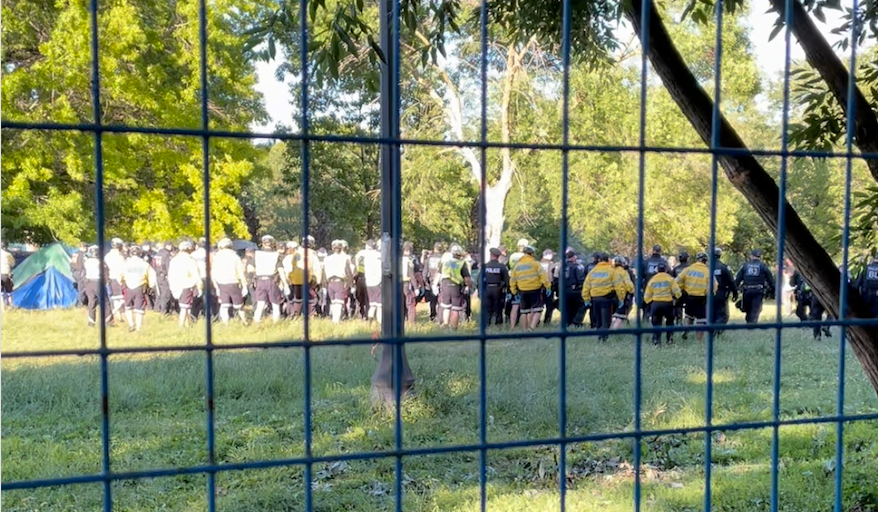Toronto Encampment Clearings Becoming Sites Of Excessive Police Force
By: Jocelyn Heaton, Summer Student
Homeless encampments have existed in Canadian cities for years, but the COVID-19 pandemic has pushed the issue into the spotlight. Pressure was put on cities to provide safe housing to the often-vulnerable people living in encampments. In Toronto, the cities response has largely been to set up temporary shelters in hotels.[1]
Despite these efforts, many homeless people do not feel safe in these shelters, citing isolation as a major concern, and instead choose to live in encampments. Of note are the increased overdose deaths in city shelters, with 2020 being the deadliest year on record; there were 74 overdose deaths and 800 reversed overdoses in city shelters.[2] Many supporters and residents cite the community care and harm reduction tools present in encampments as a defining difference that makes life in an encampment not just more appealing, but safer.
As a result, the City of Toronto has continued its policy of encampment clearing in the summer of 2021. The eviction notices given to residents assert the authority of the Trespass to Property Act, stating that the residents themselves and/or their belongings are on City of Toronto property, contrary to Chapter 608 of the Toronto Municipal Code, and enforceable by removal and/or disposal of any personal property in the Park.[3]
Since May, Lamport Stadium, Trinity Bellwoods, and Alexandra Park have been cleared, with other major encampments on edge that they are next. Support workers in these encampments have claimed that overdose risk increases greatly in the days leading up to encampment evictions.[4]
At these clearings, community members showed up en masse to support encampment residents. The Toronto Encampment Support Networks along with other activist groups guide people’s actions to support residents and their desired outcomes.[5] At Alexandra Park, that meant simply asking that people attend, witness, and provide comfort to residents while the park was cleared. Most recently at Lamport Stadium, that meant creating physical barriers between residents, their belongings, and the police.
As a result of these clearings, there have been many arrests and charges. In demonstrating against the clearings, community supporters and residents are being charged with trespassing under the Trespass to Property Actfollowing through on the eviction notices. Additionally, it is possible that Criminal Code charges of mischief (s. 430) nuisance (s. 180), resisting or obstructing police (s. 129) or assaulting a peace officer (s. 270) may result depending on the circumstances. Regardless of the charges, social media footage of the clearings show excessive levels of police force being used during these arrests.
The Charter of Rights and Freedoms provides various guaranteed rights relating to police search and arrest. Under s. 8 of the Charter, people are protected against unlawful search and seizure and under s. 9, people are protected against arbitrary detention or imprisonment. Additionally, everyone has a right under s. 10 to be informed of the reasons for their arrest or detention, to retain and instruct counsel without delay, and to be informed of that right.
As per R v Grant [2009] 2 SCR 353[6], if the manner of search is “unreasonable”, the arrest may be deemed unlawful. As per s. 495 of the Criminal Code, an officer must have reasonable grounds to believe a person has committed or is committing an indictable offence in order to arrest them without a warrant. As per R v Suberu, 2009 SCC 33[7], rights to counsel must be meaningfully provided without delay upon arrest or detention, meaning immediately, subject to officer safety. Due to the violent and volatile nature of these clearings, it is possible that searches or arrests may be subject to Charter challenges on these grounds. Other issues and possible defences may be applicable, depending on the circumstances.
If you or someone you know has been criminally charged at any of these encampment clearings, contact us at 416-304-1414 and we may be able to help.
[1] https://globalnews.ca/news/7701858/toronto-program-homeless-encampments-hotels/
[4] https://right2housingto.ca/wp-content/uploads/2020/09/R2HTO-Encampents-Rights-Review-final.pdf pg. 11
[5] https://www.encampmentsupportnetwork.com/
[6] https://scc-csc.lexum.com/scc-csc/scc-csc/en/item/7799/index.do
[7] https://scc-csc.lexum.com/scc-csc/scc-csc/en/item/7800/index.do


